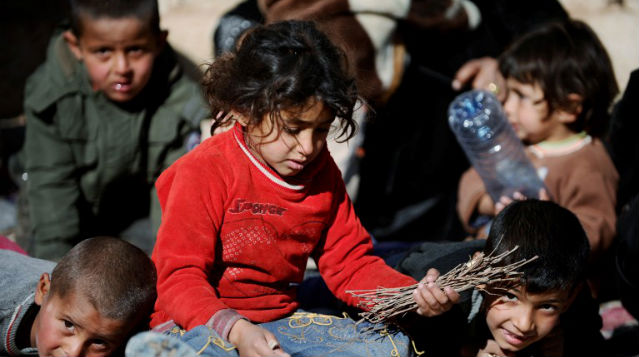SUMMARY
This is AI generated summarization, which may have errors. For context, always refer to the full article.

UWAIT CITY, Kuwait – The UN sent out a distress signal Wednesday, January 15, warning that nearly half Syria’s population needs urgent humanitarian assistance and that some 245,000 Syrians living in besieged areas are facing severe food shortages.
The warnings by UN Secretary General Ban Ki-moon and UN Emergency Relief Coordinator Valerie Amos came at a one-day donors’ conference in Kuwait City aimed at raising $6.5 billion in aid for war-affected Syrians.
During the Second International Humanitarian Pledging Conference, donors stumped up a combined $1.6 billion, way short of the target but more than the amount of $1.5 billion pledged at a similar meeting a year ago.
The Kuwait gathering comes a week before the so-called Geneva II peace conference, which is aimed at ending the conflict that has killed 130,000 people in nearly three years.
In the build-up to the January 22 peace conference, which is being driven by the US and Russia, Syria’s President Bashar al-Assad held talks in Damascus Wednesday with the foreign minister of Iran, a key ally of his regime, Syrian state media said.
State television reported that Assad, during his meeting with Mohammad Javad Zarif, slammed Sunni-led Saudi Arabia’s religious ideology as “a threat to the world”,
“Everyone must contribute to the confrontation against (Wahhabism) and to eradicating it from the root,” said Assad, who belongs to the Alawite offshoot of Shiite Islam.
The comments came amid simmering tension between Syria and Saudi Arabia, which backs the rebellion against Assad.
State news agency SANA meanwhile quoted Zarif as saying the purpose of his visit “was to help ensure that the Geneva II conference brings about results that are in the interests of the Syrian people.”
Iranian media reported that UN chief Ban had reiterated his stance on the “necessity” of Iran’s presence at the Syria peace conference.
“In our negotiations with all regional and international parties who are involved in the Syrian crisis, I emphasized the necessity of Iran’s participation,” Ban was quoted as saying during a meeting in Kuwait with Iran’s Deputy Foreign Minister Hossein Amir-Abdollahian.
Syria’s opposition has issued several calls rejecting Iran’s presence at the Geneva talks, citing Tehran’s alleged military and political support to the Damascus regime.
US Secretary of State John Kerry has said Tehran could participate in talks only if it agrees to the principles set out at the creation of a transitional government.
Kerry at the Kuwait conference announced $380 million in US supplementary humanitarian aid to Syria, which he said would go to people inside Syria affected by the war and to refugees in neighboring countries.
UN chief Ban, in his address, said nearly 9.3 million Syrians — almost half the population — urgently needed humanitarian aid.
“When we met a year ago, four million Syrians needed aid … A year later, we face a regional crisis and a humanitarian crisis,” Ban said, pointing out that more than three million people have fled.
The UN’s Amos appealed for help for some 245,000 people trapped in besieged areas of Syria.
‘Trapped, hungry, ill’
“Children, women, men, are trapped, hungry, ill… (and) losing hope in the international community’s ability to help them,” she told the conference.
Several battleground areas of Damascus province and Homs province in central Syria have been under siege for at least a year.
Activists have given harrowing accounts of food and medical shortages killing dozens of people in besieged areas, including the Old City of Homs and the Yarmuk Palestinian refugee camp in south Damascus.
Syria’s deputy foreign minister meanwhile told the BBC that Western intelligence officials have visited Syria to discuss security cooperation with the regime.
Faisal Mekdad told the broadcaster that the visits to Damascus pointed to a “schism” between what Western politicians were saying about Assad’s regime and what Western security services were doing.
Western governments have backed the anti-Assad opposition but are increasingly concerned about the influence jihadist groups are wielding in the nearly three-year-old civil war.
Several battleground areas of Damascus province and Homs province in central Syria have been under siege for at least a year.
Activists have given harrowing accounts of food and medical shortages killing dozens of people in besieged areas, including the Old City of Homs and the Yarmuk Palestinian refugee camp in south Damascus. – Rappler.com
Add a comment
How does this make you feel?
There are no comments yet. Add your comment to start the conversation.